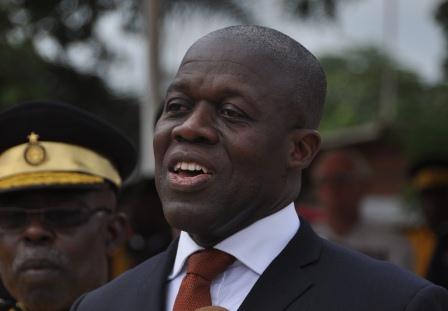Ghana fights HIV, other diseases
 The Vice-President, Mr Kwesi Bekoe Amissah-Arthur, says Ghana’s high level of political and financial commitment as well as the high expansion of services have produced significant results in the fight against the HIV/AIDS menace and other related diseases in the country.
The Vice-President, Mr Kwesi Bekoe Amissah-Arthur, says Ghana’s high level of political and financial commitment as well as the high expansion of services have produced significant results in the fight against the HIV/AIDS menace and other related diseases in the country.
Advertisement
He said the country had increased funding to the tune of GH¢150 million to complement support from the Global Fund and other development partners towards health care.
The vice-president was addressing the Special African Union (AU), Summit on the theme: “Ownership, Accountability and Sustainability of HIV\ AIDS, Tuberculosis and Malaria Response in Africa: Past, Present and the Future.”
He said the government’s component for TB also covered human resource development and improving existing infrastructure to meet the minimum standard of TB care.
Mr Amissah-Arthur said the budget earmarked for malaria control had increased from almost nothing before 2005 to around $110 million annually, stressing that “clearly Ghana is on track towards achieving the Abuja and MDG targets, aimed at responding to such diseases.
He pointed out, however, that the fight against such diseases could not be won by isolated efforts in countries with the current gaps in funding, but with a concerted effort by all member states.
“We are at a critical state where continued funding is uncertain and that calls for new approaches for domestic and international financing mechanisms towards the accelerated attainment of the MDGs,” he said.
The vice-president said in order to develop an effective response to health, particularly AIDS, tuberculosis and malaria, it was necessary to review progress made in implementing policies, best practices and programmes that had helped to slow down the three epidemics.
“We need to, indeed, take full ownership, ensure accountability and apply innovation towards increased domestic funding and local drug production” the vice-president said.
Mr Amissah-Arthur said the objectives of Ghana’s response had been to reduce further transmission of infection and to mitigate the effects of HIV and AIDS, TB and Malaria on the infected and affected, and ensure equitable and universal access to essential medicine, commodities and services necessary for improved life expectancy.
On some of the successes chalked up by Ghana in the fight against those epidemics, the vice-president said, in the last three years, the country had tripled its antiretroviral medicine coverage for pregnant women living with HIV, resulting in a 76 per cent reduction in the number of new HIV infections among children.
With respect to malaria, the vice-president said, fewer children were dying with under-five malaria case fatality rate witnessing a 96 per cent reduction.
He said malaria related deaths for all ages, had also reduced from 6,100 in 2000 to 2,815 in 2012.
THE Vice-President, Mr Kwesi Bekoe Amissah-Arthur, says Ghana’s high level of political and financial commitment as well as the high expansion of services have produced significant results in the fight against the HIV/AIDS menace and other related diseases in the country.
He said the country had increased funding to the tune of GH¢150 million to complement support from the Global Fund and other development partners towards health care.
The vice-president was addressing the Special African Union (AU), Summit on the theme: “Ownership, Accountability and Sustainability of HIV\ AIDS, Tuberculosis and Malaria Response in Africa: Past, Present and the Future.”
He said the government’s component for TB also covered human resource development and improving existing infrastructure to meet the minimum standard of TB care.
Mr Amissah-Arthur said the budget earmarked for malaria control had increased from almost nothing before 2005 to around $110 million annually, stressing that “clearly Ghana is on track towards achieving the Abuja and MDG targets, aimed at responding to such diseases.
He pointed out, however, that the fight against such diseases could not be won by isolated efforts in countries with the current gaps in funding, but with a concerted effort by all member states.
“We are at a critical state where continued funding is uncertain and that calls for new approaches for domestic and international financing mechanisms towards the accelerated attainment of the MDGs,” he said.
The vice-president said in order to develop an effective response to health, particularly AIDS, tuberculosis and malaria, it was necessary to review progress made in implementing policies, best practices and programmes that had helped to slow down the three epidemics.
“We need to, indeed, take full ownership, ensure accountability and apply innovation towards increased domestic funding and local drug production” the vice-president said.
Mr Amissah-Arthur said the objectives of Ghana’s response had been to reduce further transmission of infection and to mitigate the effects of HIV and AIDS, TB and Malaria on the infected and affected, and ensure equitable and universal access to essential medicine, commodities and services necessary for improved life expectancy.
On some of the successes chalked up by Ghana in the fight against those epidemics, the vice-president said, in the last three years, the country had tripled its antiretroviral medicine coverage for pregnant women living with HIV, resulting in a 76 per cent reduction in the number of new HIV infections among children.
With respect to malaria, the vice-president said, fewer children were dying with under-five malaria case fatality rate witnessing a 96 per cent reduction.
He said malaria related deaths for all ages, had also reduced from 6,100 in 2000 to 2,815 in 2012.




